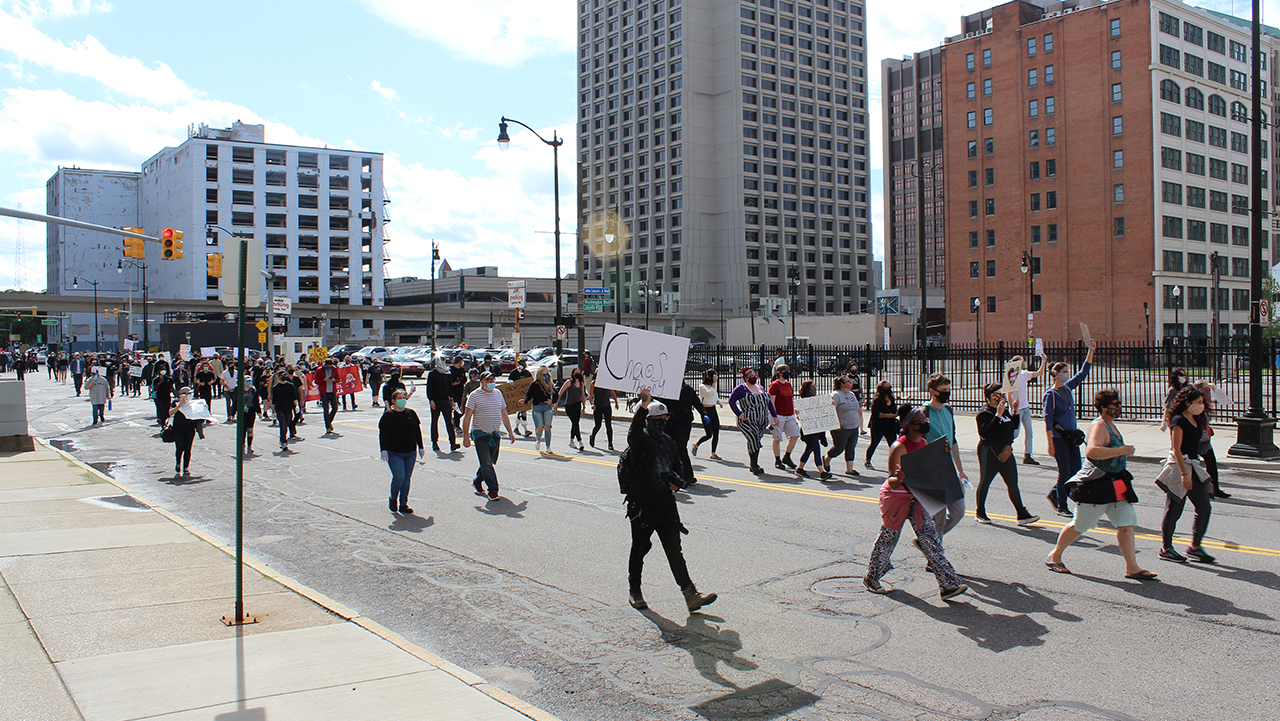Protestors March for Change, But Lansing Lawmakers Offer Little
The nation is now in its third week of protests against police brutality after a Minneapolis police officer killed George Floyd. But protesters’ urgent desire for reform isn’t matched by lawmakers in Lansing.

Hundreds of protesters marched on Lansing two weeks ago at an NAACP-sponsored protest.
The next day, state lawmakers in the House Judiciary committee — tasked with creating change — gaveled in.
Click on the player above to hear how Lansing legislators are approaching demands for police reform.
State Senator Jeff Irwin (D-Ann Arbor) has introduced a bill which requires non-bias, de-escalation, and mental health training for police. It passed the state Senate and now is in the state House committee. Irwin says that in a lot of places many of these trainings are already on the books.
“I know that in my local force they have a duty-to-intervene policy in their ongoing training,” Irwin says. “With this legislation we were trying to kind of hit a sweet spot of providing some guardrails that would give the public more assurance and sort of nudge this training in the right direction.”
“How is it that we haven’t made more progress in the years?” — Beverly Boatley, resident
But some Michiganders calling for change are unimpressed.
“How is it that we haven’t made more progress in the years?” Asks Beverly Boatley, a protestor from Holt, Mich., who was at the NAACP protest with a card stock poster of a smiling young black man — her 20-year-old grandson Elijah Boatley who was killed by police in Phoenix. “The decades that people have been pushing for this, why did it take this time for this to come out like it has?”

Floor, Not the Ceiling
A lot of changes that have been recommended recently at the capitol, including Irwin’s bill, were written years before the nationwide protests. Irwin said he got the idea from DeRay McKesson, an activist and co-founder of Campaign Zero — a non-profit that proposes police reforms.
McKesson says the bills that have been introduced in Michigan that focus on better training, a chokehold ban and allowing bystander intervention are bare necessities.
“If we can improve training, if that can make a small difference, then we should make that small difference.” — State Senator Jeff Irwin (D-Ann Arbor)

“While it is a good thing to do, we can’t let people okey-doke us into believing that this is like some monumental move,” McKesson says. “This is the floor not the ceiling.”
McKesson says there’s little research to show that implicit bias training works, and reforms like this are a smokescreen.
Irwin says he gets it, more needs to be done. He wrote the bill years ago in response to the police killings of Tamir Rice, Michael Brown and Philando Castile.
“Those situations occurred and there was no action,” says Irwin. He even considered whether the bill was too small for the current moment. But “if we can get it done, if we can improve training, if that can make a small difference, then we should make that small difference that’s important to me.”
Another reform introduced by a Senate Democrat announced a statewide effort that would collect Michigan use-of-force data — but departments are only encouraged to report. The bills banning chokeholds and on bystander intervention haven’t had committee hearings.
Tristan Taylor, a protest organizer in Detroit, says this is part of a pattern he’s observed — one where lawmakers introduce resolutions or ideas that are real reforms, but it’s not included in legislation.
“If the politicians and the legislature were serious, they would find a way,” to pass new proposals into law. “That should be their starting point, not passing legislation that emphasizes laws that already exist or rather rules that already exist and that aren’t followed.”
No Teeth
For Boatley, the protestor from Holt, the top reform she’s pushing for is taking away qualified immunity — which protect police officers from liability in civil suits — and it’s frustrating to watch the legislature make small reforms.
And she may have a point. Research shows that if lawmakers don’t add teeth to their proposals, or address things like funding, it’s hard to imagine these reforms could be effective.
“These minimum standards are the current best practices, that doesn’t mean we understand the effectiveness in addressing them.” — Ayesha Bell Hardaway, Case Western Reserve University
“While these minimum standards are the current best practices that are looking to reform policing, that doesn’t necessarily mean we understand the effectiveness in addressing them,” says Ayesha Bell Hardaway, an Assistant Professor of Law at Case Western Reserve University. She studies police reforms and serves on the independent monitoring team evaluating police reforms in Cleveland.
“You pull out implicit bias training as something that is questionable and quite honestly without knowing what the curriculum looks like and who’s delivering that training it’s hard to understand if it will really be effective,” Hardaway says.
Legislators from Congress down to the local Mayor’s office are dealing with police reforms right now. But Hardaway says unless they address the powerful interests that maintain the status quo like police union contracts and qualified immunity it will be hard to repair damage.
For people like Boatley, reform is urgent. Protesters are calling for drastic overhauls of the way policing works and addressing systemic racism. Currently, the reforms in the state legislature don’t even come close.
Trusted, accurate, up-to-date
WDET is here to keep you informed on essential information, news and resources related to COVID-19.
This is a stressful, insecure time for many. So it’s more important than ever for you, our listeners and readers, who are able to donate to keep supporting WDET’s mission. Please make a gift today.
